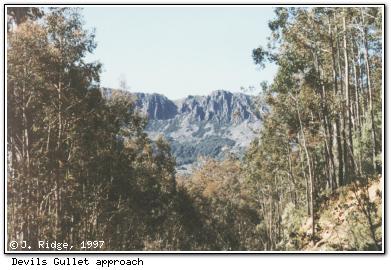  |
||||



|
Mole Creek A visit to the Trowunna Wildlife Park will give you a look at Tasmanian Devils "in action"; it is also possible to hold or hand feed wallabies, kangaroos and baby wombats, as well as observing native birds such as the kookaburra and wedgetail eagle. Shows involving koalas, wombats and Tasmanian Devils are held three times daily.
 Close to Mole Creek are the popular King Solomon and Marakoopa Caves, which are open for the public to tour. Devils Gullet State Reserve is 40 km (25 mi) from Mole Creek, in one of Tasmania's United Nations-recognised World Heritage Areas. The Devils Gullet lookout stands atop a 600m (1800 ft) sheer cliff, and provides amazing 180° views of the Fisher River Valley. Part of the road to the lookout is unsealed and makes for slow going, but even the views from the road (above) are attractive. Mole Creek has one 4-star and four 3½-star accommodations (RACT rated). © 1995-2010 |
|||